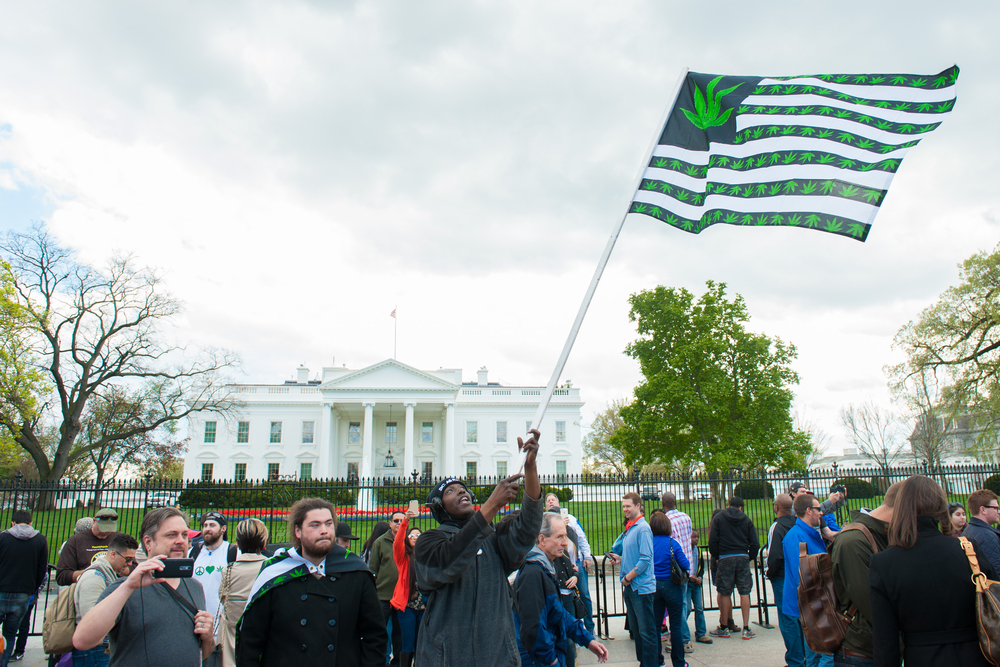2024 may be another historic year for American cannabis, with many implications for social and criminal justice. Recent findings from the American Food and Drugs Administration (FDA) highlighted that more than 30,000 healthcare professionals across the US can currently recommend the medical use of cannabis for at least 15 medical conditions to more than six million registered patients. It further recommended that the Drug Enforcement Agency (DEA) reschedule cannabis to Schedule III, placing it in the same controlled status as ketamine and testosterone.
The nation is ready for a responsible plan that reforms America’s broken cannabis laws and undoes the harms of over-policing and excessive incarceration. According to a POLITICO poll of October 2022, 73% of all voters were either in support of or ambivalent on cannabis, including 84% of Democrats, 76% of Independents, and 58% of Republicans.
And not only are voters ready for leadership, they’ll reward it – especially when tied to overwhelmingly popular social equity policies that help to create jobs and wealth for communities harmed by the war on drugs.
A Monmouth poll in October 2022 found that Americans’ support of cannabis legalisation increased in the three weeks after President Biden announced plans to pardon Americans with minor federal cannabis possession convictions.

Pairing responsible cannabis regulation with social justice initiatives has proven effective for Democrats and advocates in Blue and Red states alike. Ohio voters passed Issue 2, with 57% of the electorate voting to legalise cannabis with robust and generous social equity programmes in November 2023. Meanwhile in Massachusetts, lawmakers, advocates, and regulators spent 2022 and 2023 passing and implementing a grant and loan fund that is just coming online to send millions of dollars of cannabis tax revenue back to communities harmed by the war on drugs.
Time for (executive) action
With the DEA confirming that it is considering rescheduling cannabis, President Biden should get ahead of the political process so heavily influenced by special interest lobbyists, and bring about change. Now is the time to put forth a cohesive, incremental, inclusive path forward for federal agencies and Congress to follow, while continuing to use his Presidential powers to mitigate the harms caused by cannabis prohibition.
President Biden should show voters he’ll deliver on his promises to support decriminalisation and expungement with an “Expanding Decriminalisation of Marijuana Executive Order” that:
- Directs the Department Of Justice to issue guidance related to individuals and businesses specifying that prosecutions for cannabis-related conduct will be deprioritised, reducing sentences, and ending cannabis-related deportations
- Expands pardons for cannabis-related offences beyond simple possession, for both civilians and military, calling on states to do the same
- Expressly states the Administration’s support for Congressional action to legalise cannabis with regulations that prioritise reparative justice and equitable economic opportunity and protect public health, consumers, workers, and state regulatory frameworks and equity programmes
- Directs all relevant agencies to support small business development and prevent the monopolisation of the industry or the influence of predatory industries (including tobacco, alcohol, pharmaceutical, and exploitive gig employers) within the market.
In addition to following through on his campaign promises, President Bident could avoid political landmines and leverage the policy and politics of cannabis to reassure his base while appealing to Independent voters. At the same time, it would be a move to support public health and safety, two key issues to gain political support in the run up to the November elections.
What would such an order do?
An Executive Order to respect and protect states’ cannabis reforms could:
- Establish a taskforce of all relevant federal agencies and representatives from state regulators, those harmed by prohibition and criminalisation, criminal justice reformers, social equity and small businesses, testing labs, state lawmakers, and all other impacted stakeholders to discuss the impact that rescheduling would have on existing state licensing schemes, consumers, and patients.
- Direct the taskforce to develop plans for all relevant federal agencies to respect and protect state licensing, regulatory, and equity policies.
- Direct the taskforce to develop plans for policies that promote jobs, rehabilitation, and criminal justice reforms in communities harmed by cannabis policies, including providing access to federal small business assistance programmes to state-licensed cannabis businesses.
- Direct the IRS to deprioritise enforcement of Section 280E of the Internal Revenue Code against state-licensed cannabis businesses so that they can deduct their legitimate business expenses from their gross income associated with the still federally-illegal “trafficking” of cannabis and pay a fair tax bill
- Direct the Financial Crimes Enforcement Network (FinCEN) to issue updated guidance on BSA Expectations Regarding Marijuana-Related Businesses to affirm the federal government’s position that state licensing and regulatory frameworks will be respected and considered sufficient in the absence of Congressional action.
President Biden and Democrats across the country can champion a policy that will have a broad appeal by focusing on repairing the devastation that over-policing has wrought on American cities, focusing instead on a future of job and business creation, social justice and criminal justice reform.
Holding back Big Cannabis
2024 will be an important year to determine whether advocates for criminal, social and cannabis justice reform are strong enough to prevent the influence of big monied lobbyists from shaping cannabis’ state and federal future.
Some efforts, like “United for Marijuana Decriminalization” should serve as inspiration for action. The Parabola Center has developed and supported resources to support political advocacy, including:
- Cannabis Cannibalism: How Federal Rescheduling Could Consume the State-Licensed Industry
- Cannabis Legalization Must Address Monopoly Dangers
- “Bigger is Not Better” Preventing Monopolies in the National Cannabis Market
- Legalize it Right: Federal Cannabis Regulations Recommendations
As state industries mature, it will be important to keep an eye on state legislators and regulators. Even when policy wins happen, they’re still under attack: the Ohio social equity provisions approved just last year are already being chipped away by Ohio’s Governor DeWine and Republican state legislators, aided by medical cannabis lobbyists. Both chambers of the New Jersey legislature have approved a bill to allow vertically integrated operators to expand from one retail licence to five. And there are efforts underway by big operators in Massachusetts to consolidate their market capture by expanding the number of licences they can own, making the struggle for equity businesses that much harder.
Building on past lessons – and the big challenge ahead
Each year since Colorado voters legalised cannabis in 2012, state after state has built on the lessons of those that came before, leveraging past lessons to create a market of opportunities for communities harmed by previous government policies and systemic oppressions. The growing focus on restorative justice, and especially investing cannabis tax dollars back into harmed communities, highlights that both voters and policymakers acknowledge the harmful activities that government actions created to certain communities. They now have a responsibility to regulate the market in a way that enables those communities to participate and benefit.
We’ll find out in 2024 if voters and policymakers will be able to stand up to the pharma, tobacco, and alcohol lobbyists and foster meaningful opportunity for cities and small businesses across America – and if those opportunities will survive the next presidential administration. The reality is that a cannabis industry that prioritises profits over consumers, workers, and children will be championed by a second Trump presidency and a GOP-controlled Congress.
While former President Trump proclaimed that “I did criminal justice reform, nobody else. I did it. Without me, you don’t have criminal justice reform,” by signing the First Step Act, POLITICO reported that “Trump himself rarely, if ever, mentions criminal justice reform… having grown convinced the First Step Act never produced the spike in support from Black voters that he expected.”
Beyond an awful criminal justice record that was limited to doling out occasional high profile and corrupt pardons, the former President appointed prohibitionist Attorney General Jeff Sessions, who rescinded the Cole memo, which previously provided guidance and assurance to state legal cannabis programs.
By taking the lead on decriminalisation, supporting states and small businesses, and charting a responsible path forward with Congress, President Biden might just have a chance to excite his base, shore up independents, and continue the work in 2025.


